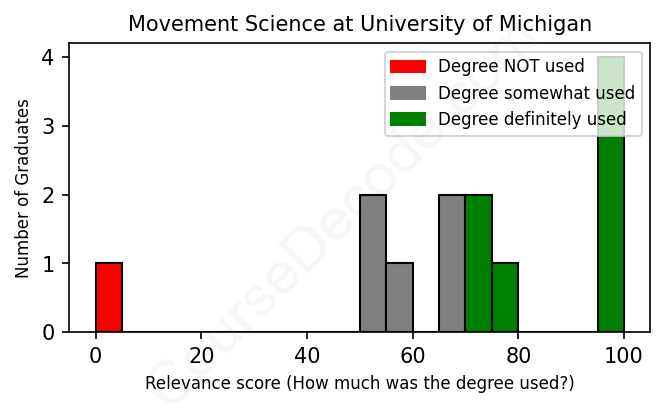
First, some facts. Of the Movement Science graduates from University of Michigan we've analyzed , here's how many have used (or NOT used) their degree in their career:

These are estimates based on AI analysis of 13 LinkedIn profiles (see below).
The verdict? Slightly above average. Overall, with an average relevance score of 70%, Movement Science graduates from University of Michigan have a slightly higher likelihood (+3%) of finding work in this field compared to the average graduate across all fields:
And for comparison, here's the chart for all profiles we've looked at across all degrees.
Also, after graduating, 61% of these graduates have pursued further education other than another Bachelor's degree (such as a Masters degree or other), compared to the average across all profiles of 35%. This suggests you may need more than just a Bachelors degree to be competitive as a Movement Science graduate.
See the details:
|
Relevance score: 100% We think this person has gone into a career highly relevant to their degree. We think this person has gone into a career highly relevant to their degree.
DEGREE INFOGraduated in 2010 from University of Michigan with a Bachelor of Science - BS in Movement Science. Also pursued further education since (see below). JOB HISTORY SINCE GRADUATIONClinical Faculty Physical Therapist University of Southern California Aug 2014 - Aug 2017 Physical Therapist  Shirley Ryan AbilityLab Aug 2017 - Nov 2018 Parkinson's Disease and Movement Disorder Program Manager  Shirley Ryan AbilityLab Nov 2018 - May 2022 Clinical Manager- Outpatient Neurology  Shirley Ryan AbilityLab May 2022 - Present FURTHER DEGREES DONE SINCE GRADUATINGDoctorate of Physical TherapyUniversity of Southern California 2011 - 2014 ABOUTNo information provided. |
The top 10 most common jobs done by the graduates we've analyzed (ranked most common to least) are:
From analyzing the job titles of alumni who studied Movement Science at the University of Michigan, it's clear that many have gravitated towards roles in physical therapy and education, which are pretty relevant to their field of study. A significant portion of these grads became physical therapists, clinical exercise physiologists, or physical education teachers, all of which rely heavily on knowledge about human movement, rehabilitation, and physical health. It's great to see so many people applying what they learned in the classroom to help others improve their physical abilities and health outcomes.
On the flip side, there are also quite a few alumni who ended up in jobs that aren't closely related to Movement Science at all. Positions like loan originators, lending support specialists, and event coordinators don't really connect to the core principles of the degree. It's kind of a mixed bag; while a solid number go into fields that capitalize on their training, there's a fair share who veer off into unrelated careers. This shows that while a Movement Science degree can lead to fulfilling and relevant work, it doesn't lock graduates into just one career path! Overall, the degree offers versatility but also faces competition from other fields that might lure its graduates with different opportunities.
Here is a visual representation of the most common words in job titles for Movement Science graduates (this is across all Movement Science graduates we've analyzed, not just those who went to University of Michigan):

Looking at the career trajectories of Movement Science graduates from the University of Michigan, you can see a mix of paths. Many seem to start with relevant jobs right after graduation, often in roles related to physical therapy, exercise physiology, or education. For instance, some graduates took positions as rehab technicians or physical education teachers, which aligns well with what they'd studied. These early jobs can set the stage for more specialized roles, particularly in healthcare, as seen with those who transitioned into physical therapist roles and management positions in recovery-focused facilities.
However, not all paths are straightforward or directly aligned with Movement Science. Some graduates ended up in seemingly unrelated fields—like lending and business management—raising questions about how well the degree translates into certain careers. Fast forward five to ten years, and you see a clearer division: while many have found stability and growth in healthcare-related roles, others have ventured far from their Movement Science roots. So, in essence, while many graduates do stick to careers that utilize their skills and knowledge, some may find themselves in unexpected industries altogether. It really depends on the individual and the opportunities they pursue after graduating!
Honestly, a Bachelor’s degree in Movement Science at the University of Michigan can be pretty challenging, but it really depends on your interests and strengths. The program dives into some pretty complex topics like biomechanics, anatomy, and exercise physiology, which can be intense if you're not super into those subjects. That said, if you enjoy science and being active, you might find it engaging rather than overwhelming. The coursework tends to require a good amount of study time and commitment, and you’ll likely have to balance practical work with theoretical learning. Overall, it’s not necessarily harder than average, but it definitely demands your effort and passion to keep up!
Most commonly, in the LinkedIn profiles we've looked at, it takes people 4 years to finish a Bachelor degree in Movement Science.
Alright, so here’s the scoop on these University of Michigan Movement Science grads and their job journeys. It seems like they've found jobs in various fields, from physical therapy to education and business management, but the paychecks have got to be a mixed bag. Some, like the Clinical Manager at a major rehabilitation center and the Territory Manager at a medical company, are probably raking in decent salaries, especially in healthcare settings. However, others, like the substitute teachers or farm hands, likely aren't making much more than minimum wage during those gigs. Overall, it looks like some of these folks are set for good financial futures, while others might still be working their way up the ladder. So, in a nutshell, while some are cashing in, others might be struggling a bit more.
Here is a visual representation of the most common words seen in the "about" section of LinkedIn profiles who have a Bachelor degree in Movement Science (this is across all Movement Science graduates we've analyzed, not just those who went to University of Michigan). This may or may not be useful:

Here are all colleges offering a Bachelor degree in Movement Science (ordered by the average relevance score of their Movement Science graduates, best to worst) where we have analyzed at least 10 of their graduates:
| College | Score | Count |
|---|---|---|
 University of Michigan University of Michigan
|
70 | 13 |